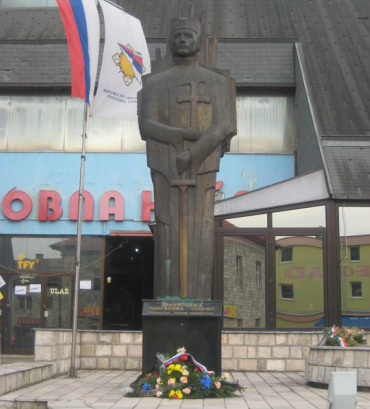posts
|
While ministering in Bosnia in the Spring of 2011, I visited the Mehmed Paša Sokolović Bridge, the site where some 2500 Bosnian Muslims were massacred by the Serbian army and their bodies thrown in the the Drina River. While it was difficult to imagine such an atrocity happening in the mid-1990s, it was even more troubling to cross the bridge and find this monument dedicated to the bravery of the Serbians. As we gaze at the picture, we find a sword in one hand and a cross in the other--quite a statement of nationalism cloaked in Eastern Orthodox Christianity. As I looked at the monument, I could not help but think of the Emperor Constantine who also put cross-like symbols on the armor of his soldiers--a symbol of an ever growing Christendom (the marriage of church and state) in the Roman Empire that would fully flower by the end of the first millennium.
The question that I wrestled with in Rethinking Constantine was did the rise of Constantine signal the end of Christian mission as we understand it in the Scriptures? This is a complicated question with no simple answers as the abstract from that chapter shows: Christianity is a missionary faith. This is certainly evident from the “Great Commissional” type passages of Scripture, verses preached from and visibly posted in modern evangelical missions conferences, but even more so from the overall thrust of Scripture. That is, the mission of God (missio Dei) is the grand narrative of the Old and New Testaments and thus, in the opinion of some scholars, Scripture should be read with a hermeneutic of mission. Whether this approach to Scripture is fully accepted or not, mission remains in the DNA of the Christian faith and the Christian movement prior to the fourth century demonstrated this value. But did mission—proclaiming the death, burial, and resurrection of Christ and ministering to all nations in word and deed—cease with Constantine’s conversion and his giving Christianity a preferred status within the Roman Empire? Did Christendom, which expanded through political, military, and economic power replace Christian mission? In this chapter, I will argue that Christian mission did continue past Constantine, though the narrative certainly becomes more confusing following his rise to power. Beginning with a working definition of mission, I will discuss some representative elements of this diverse history showing examples of Christendom that appear to abandon mission altogether. However, this inquiry will largely reveal accounts of missionaries working within a state-church paradigm or at least approaching mission in full view of political authorities. In terms of scope and limitations, I will focus on missions within or from the Roman Empire from the fourth to eighth centuries. Finally, in my concluding section I will offer some points of reflection for modern Christians, particularly evangelicals, contemplating the history of missions. Learn more about the book HERE or HERE. Comments are closed.
|
Archives
November 2023
|

 RSS Feed
RSS Feed
